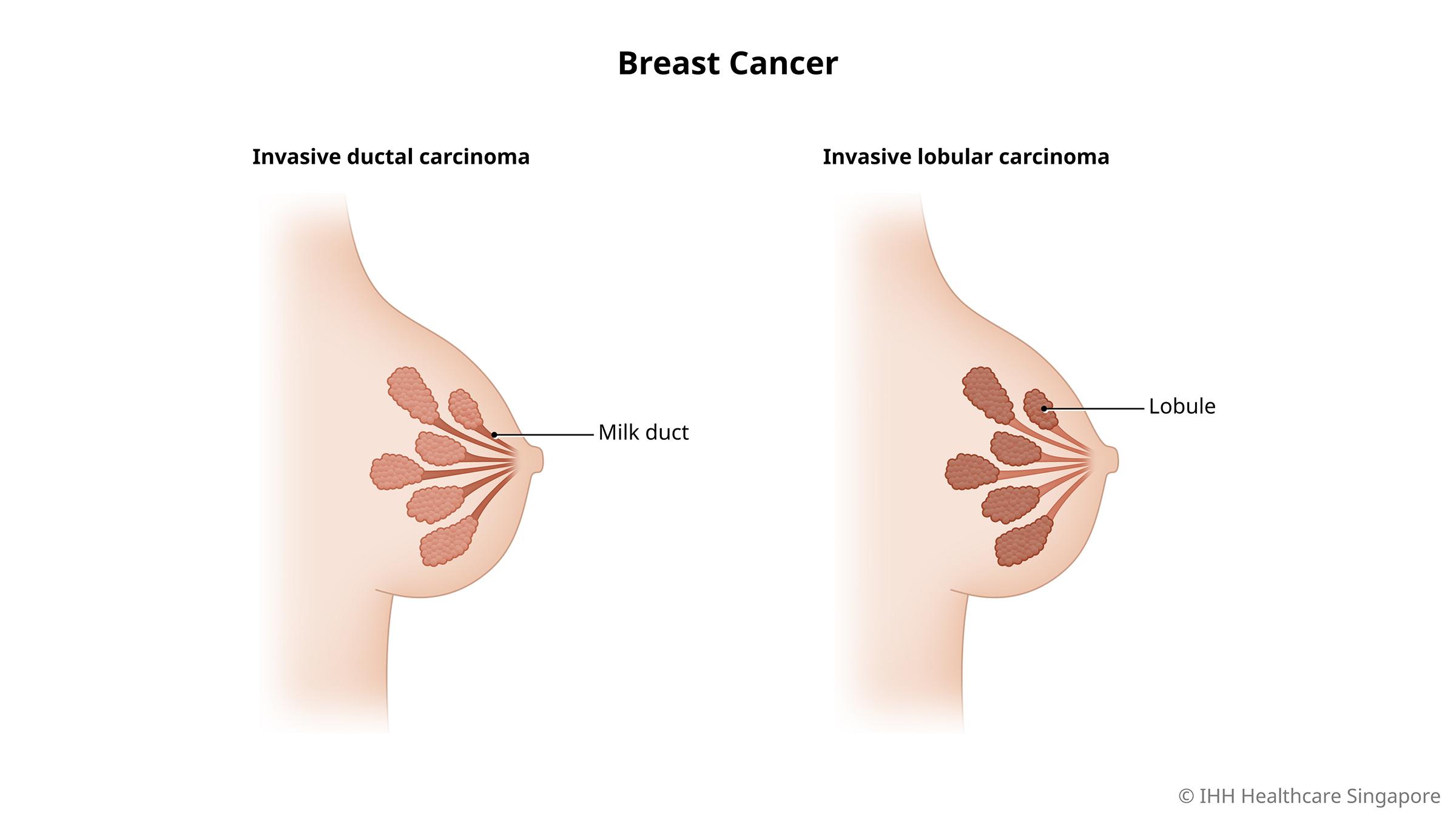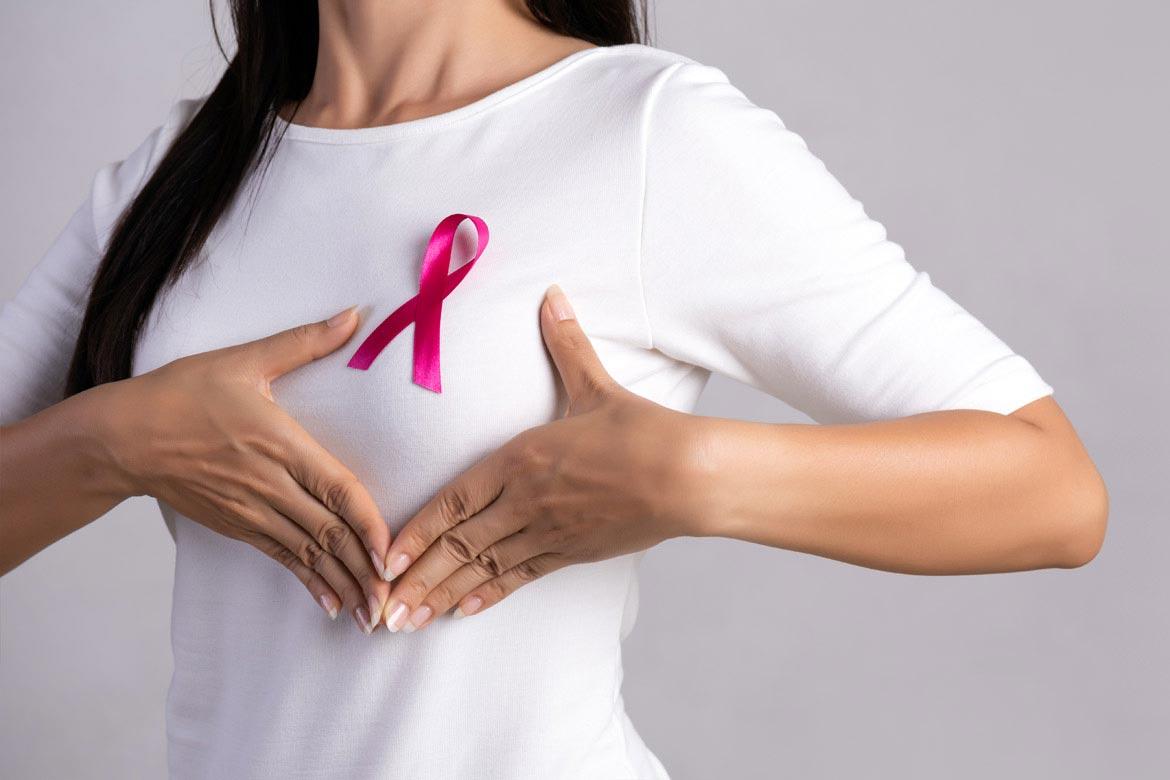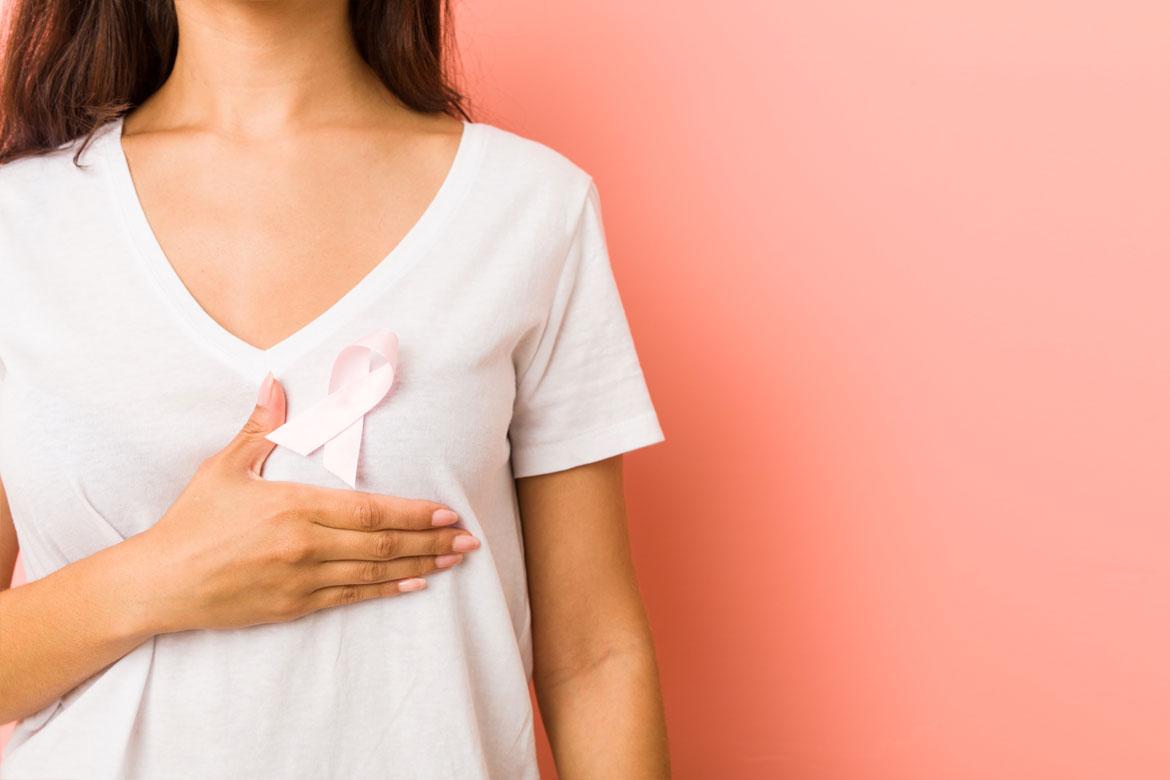
Breast Cancer
What is breast cancer?
Breast cancer is an abnormal growth of tissue in the breast that can sometimes be felt as a lump. The tumour develops when cells in the breast divide without control and produce extra tissue. It can be benign (non-cancerous) or malignant (cancerous). Cancerous cells can spread within the breast, to lymph nodes (glands) in the armpit, and to other parts of the body.
Breast cancer is the most commonly diagnosed female cancer among Singaporean women. Almost 1 in 13 women in Singapore will be diagnosed with breast cancer in their lifetime.
Types of breast cancer
The 2 most common types of breast cancer are:
Invasive ductal carcinoma
This occurs when cancer cells grow from within the ducts and invades the surrounding breast tissue. This type accounts for 70 – 80% of breast cancer cases.
Invasive lobular carcinoma
This originates from the breast lobules and invades the surrounding tissue. This type accounts for 10 – 15% of all breast cancer cases.
Other rarer forms of breast cancer include:
- Mucinous, papillary and tubular carcinomas, which usually have better prognoses than ductal and lobular cancers.
- Paget’s disease of the nipple, a condition where breast cancer manifests as changes of the nipple, usually as a rash, and may be mistaken for eczema. An associated breast cancer is typically diagnosed on further imaging of the breast, although the cancer is rarely limited to the nipple.
- Inflammatory breast cancer, an uncommon but aggressive form of breast cancer. The breast has a red and swollen appearance, sometimes without the presence of a breast lump. When what appears to be breast infection (mastitis) does not resolve with antibiotic treatment, a biopsy is required to exclude inflammatory breast cancer.
Stages of breast cancer
Breast cancer is assessed in 5 stages:
- Stage 0: This stage is often referred to as ductal carcinoma in situ (DCIS). During this stage, the cells are still limited to within a duct and have not yet started spreading to surrounding tissues.
- Stage I: At this stage, the tumour is <2cm. However, it has not begun to affect the lymph nodes and other surrounding tissues.
- Stage II: The tumour is between 2 – 5cm, and may have started spreading to nearby lymph nodes.
- Stage III: The tumour has become >5cm and/or has spread to surrounding lymph nodes and surrounding tissues. It may have also invaded the skin or chest wall.
- Stage IV: The cancer has spread to distant body organs such as the brain, liver, and lungs.
Stage 0 and 1 breast cancers have close to 100% relative survival rates at 5 years, while Stage 2 and 3 breast cancers have lower 5-year relative survival rates of 90% and 70% respectively. Stage 4 breast cancer, however, has a relative 5-year survival rate of 23%.
What are the symptoms of breast cancer?
Breast cancer symptoms include:
- A painless lump in the breast
- Bleeding or unusual discharge from the nipple
- Dimpled or puckered skin over the breast
- Persistent itch and rash around the nipple
- Pulled in or retracted nipple
- Swollen and thickened skin over the breast
Learn more about breast lumps and when you should speak to a doctor about them.
What causes breast cancer?
The cause of breast cancer is unknown and likely due to a combination of genetic, environmental and lifestyle factors. All women, regardless of age and general health condition, are at risk of getting breast cancer.
However, the following factors may increase the risk of breast cancer:
- Age (women above 40 years)
- Menstruating at a younger age (below 12 years)
- Having menopause at a later age (above 55 years)
- Having a late childbirth
- Family history of breast cancer
What are the complications and related diseases of breast cancer?
Breast cancer can lead to other diseases and complications. Potential complications include:
- Bone resorption or breaking down of bones
- Fractures due to weakening of bones
- Spinal compression or pressure on the spinal cord and nerves – can cause neck or back pain, numbness, tingling sensation, difficulty in walking, and problems in bladder and bowel control
- Hypercalcaemia (high level of calcium in the blood) – can lead to irregular heartbeat, kidney stones, kidney failure, confusion, dementia or coma
- Lung complications that lead to chest discomfort, shortness of breath, wheezing, cough, tumour, pleural effusion or fluid in the lungs
- Liver complications that lead to stomach pain, weight loss, vomiting, problems with waste removal, and jaundice
- Brain complications that lead to frequent headaches, dizziness, nausea, vomiting and seizures
Complications in breast cancer treatment
In any breast cancer treatment, the normal cells may be affected. Thus, treatments may lead to side effects and complications, such as:
- Mouth sores
- Nausea
- Nerve damage
- Diarrhoea
- Burning pain and scarring due to radiation therapy
- Post-surgery pain
- Lymphoedema or swelling
- Infection
- Hematoma – blood build-up outside the blood vessels
- Seroma – fluid build-up underneath the skin
- Negative reaction to anaesthesia
- Heart disease
- Secondary cancers like leukemia and soft tissue sarcoma
How do you prevent breast cancer?
While there is no certain way to prevent breast cancer, maintaining some healthy habits can help lower your risk. Here are some of them:
- Maintain a healthy weight
- Engage regularly in physical activities
- Limit or avoid alcohol
- Breastfeed
- Perform monthly breast self-examinations and go for regular breast screening
If you have an increased risk of breast cancer, you may also wish to consider:
- Undergoing genetic counselling and testing
- Taking hormonal therapy to lower your breast cancer risk
- Preventive surgery (for women with very high risk)
This coverage checker is brought to you by Health Insured, an online resource that helps you understand your health coverage in Singapore.
This page has been reviewed by our medical content reviewers.
Need help?
For enquiries, please call
+65 6250 0000 (Orchard) or +65 6898 6898 (Novena)
For appointment bookings, please WhatsApp
+65 8111 7777 (Orchard) or +65 8111 5777 (Novena)
 Brain & Spine Care
Brain & Spine Care








